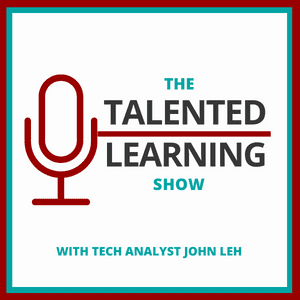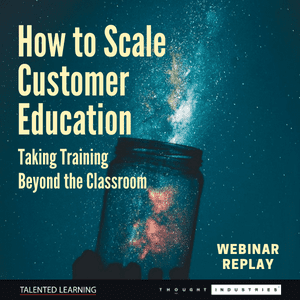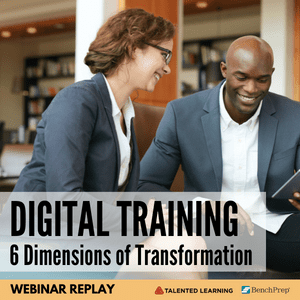
Podcast: Play in new window | Download
Subscribe: Apple Podcasts | Spotify | Amazon Music | Android | iHeartRadio | Blubrry | Email | RSS
EPISODE 55: TRAINING BUSINESS LMS ADVANCES

Barry Kelly, CEO and Co-Founder of Thought Industries
No doubt about it. Professional development and customer education markets continue to grow at a mind-bending pace. But what does this mean for systems designed to support fast-moving training providers?
Today, I’m digging deeper into this topic with Barry Kelly, CEO and Co-Founder of Thought Industries – a premier training business LMS company. Barry is a passionate innovator with proven product development success, as well as extensive experience in online learning, content strategy, and digital marketing.
Join us as we explore the latest trends in technology for companies focused on the business of learning.
TRAINING BUSINESS LMS ADVANCES – KEY TAKEAWAYS
- In recent years, training businesses have become much more digitally sophisticated — and their LMS needs are following suit. Specialist LMS providers like Thought Industries are stepping up to this challenge in a big way with a spectrum of innovative tools.
- There are clear parallels between the LMS requirements of professional training businesses and customer education organizations. This opens the door to massive market expansion opportunities for specialist LMS developers.
- Customization once was a dirty word in the LMS world. But that’s changing, thanks to new “headless” platform technology. Now, when you customize your LMS, those changes remain intact during system upgrades. No extra tinkering is required.
TRAINING BUSINESS LMS ADVANCES – Q&A HIGHLIGHTS
Barry, for those who may not be familiar with Thought Industries, could you share a snapshot?
I’m happy to do that, John. This will be our 10th year in business, and it’s been a great run. We help organizations deliver external learning, with a focus on two market segments:
- One is customer education, where we help organizations benefit from educating their customers across the entire relationship lifecycle.
- The other is professional development, including associations, certification organizations, and enterprise training companies where education is a product.
We help these organizations monetize, license, and deliver learning globally, at scale.
Why these two segments, specifically? Is that intentional?
Initially, we focused solely on professional training providers. Then in 2018, we entered the customer education market because more and more of these organizations were coming to us, inbound. They were looking for solutions to simple challenges they couldn’t address with an internally focused corporate LMS.
And that’s because of the parallel nature of requirements for these systems?
Interestingly, at scale, these two kinds of organizations actually look very similar. They’re doing essentially the same thing. They’re delivering diverse learning products globally, monetizing with strong P&L, and integrating multiple technologies to support their business needs. They’re licensing, white labeling, managing partners and resellers — the list goes on.
Our sweet spot is when these business models start becoming complex. As a result, we serve both of these use cases very successfully.
So, both kinds of organizations face challenges with traditional LMSs because those platforms aren’t designed to support an instructional content business?
Yeah. You can look at these business models from three angles:
One lens focuses on the product. You need to develop and deliver a highly compelling product to market. That can include everything from microlearning objects, all the way to multi-year blended programs with instructors and certifications, to everything in between.
Do you want deep comparative data on the world’s top 40 learning systems vendors? Check out our 2023 Corporate Learning Systems Market Update report – now available for purchase and download! GET DETAILS HERE
You need to be able to deploy high levels of diverse content for in-person synchronous, asynchronous, and semi-asynchronous learning. Plus, you need to do this very quickly, with ease.
The second lens focuses on how you package and deliver every product you offer. This includes content development, personalization, dynamic learning experiences, recommendations, subscriptions, training credits, monetization, and all of those kinds of things.
Okay…
The third lens is about administration. And there are two parts to this:
- Administrative Overhead
Reducing administrative overhead is important. Running these businesses requires a tremendous amount of administrative overhead. So very quickly, we get into the process of helping you manage your business — dealing with partners, resellers, monetization, localizations, reporting integrations, and support.
For many years, we’ve focused on the not-so-beautiful stuff, where we take on these highly complex tasks, improve them, and make them more scalable.
- Technical Overhead
There’s also a need to reduce technical debt. In many cases, we work with organizations that have built homegrown technology. And along with that, they’ve built teams that are trying to manage delivery, support, security, and everything else at scale.
So we take a lot of that pain off of your plate. And because we’re focused solely on external learning, our product roadmap doesn’t overlap with employee training. Everything we do focuses on your customers, your partners, and your external ecosystem.
That’s key. If you try to manage external training with an HR system, you can get part of the way there. But for every dollar those vendors invest in R&D, only a small portion actually goes to B2B business features.
On the other hand, with specialist LMS platforms like yours, 100% of your R&D benefits most of your customers.
Absolutely. And we’re continually pushing boundaries. Our feature development reflects use cases from everybody in our client base, so it’s a sort of rising tide. That’s one of the great benefits. I can’t imagine being a generalist LMS vendor and addressing all the inbound requests for product development outside of employee training.
But we get a lot of feedback on all of those use cases. It’s important. When business revenue is on the line every minute, you’ve got to go really deep. You need uptime at all touch points at scale. You’ve got to be prepared for it.
No doubt.
So, you said many organizations want a custom system. I often see this, too. But before specialist LMS solutions were available, these organizations had to develop their own systems. Now, this is changing with the concept of “headless” LMS platforms. What is this about?
I’d say 50% or more of the organizations we work with are being migrated off of fully homegrown technology — or something homegrown that’s integrated with off-the-shelf SaaS products. For example, a CRM or WordPress, or something like that.
Mm-hmm…
But in those scenarios, two things start to happen:
- The cost to support the technology becomes really high. Any organization that writes code experiences technical debt, and at some point, the product can get tired. You may end up spending more time just keeping your technology operational than developing and deploying new features that add business value.
- Also, especially now, there’s overhead associated with security, GDPR, and siloed data. All these things are really critical, and they can become significant overhead management investments, as well.
Makes sense.
In addition, it’s important for these organizations to focus on feature development and the benefits of seeing a more panoramic view of the market and delivering on that vision. So we work with organizations to help reduce the overall noise, reduce technical debt, create some stability in the business, and help them scale. This means that, as they continue to expand their business, they can take on opportunities much more quickly.
Sometimes it’s about enabling features rather than having to build functionality. They can also still have the benefits of being able to integrate with some remaining homegrown technologies or integrating with other ecosystems.
So integrations are a really important part of our business. We’re communicating with so many adjacent pieces of technology, CRM systems, virtual training technologies, labs, e-commerce, tax, and translation tools. The list goes on and on when it comes to being able to integrate certification engines and things like that.
Right. Ecosystems can become very complex very quickly.
I’d also like to talk about the benefits of new “headless” architecture, where you can customize any aspect of an LMS in a way that is forward-compatible. How does this work?…
…FOR COMPLETE ANSWERS TO THIS AND MORE QUESTIONS ABOUT LMS INNOVATION, LISTEN TO THE FULL 30-MINUTE PODCAST!
Need Help Finding the Best Training Content Business LMS?
Fill out the form below to request a complimentary consultation call with John Leh:





